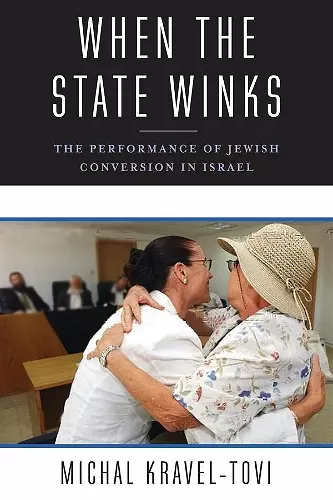When the State Winks
The Performance of Jewish Conversion in Israel
Format:Hardback
Publisher:Columbia University Press
Published:20th Oct '17
Currently unavailable, and unfortunately no date known when it will be back

When the State Winks carefully traces the performance of state-endorsed Orthodox conversion in Israel. Michal Kravel-Tovi follows conversion candidates-mostly secular young women from a former Soviet background-and state conversion agents. She complicates the popular perception that conversion is a "wink-wink" relationship in which both sides agree to treat the converts' pretenses of faith as real, developing new ways to think about the complex connection between religious conversion and the nation-state.
When the State Winks traces the performance of state-endorsed Orthodox conversion in Israel. Michal Kravel-Tovi complicates the popular perception that it is a "wink-wink" relationship in which both sides agree to treat pretenses of faith as real, developing new ways to think about the connection between religious conversion and the nation-state.Religious conversion is often associated with ideals of religious sincerity. But in a society in which religious belonging is entangled with ethnonational citizenship and confers political privilege, a convert might well have other motives. Over the last two decades, mass non-Jewish immigration to Israel, especially from the former Soviet Union, has sparked heated debates over the Jewish state's conversion policy and intensified suspicion of converts' sincerity. When the State Winks carefully traces the performance of state-endorsed Orthodox conversion to challenge the assumption that Israel turns a blind eye to the bad faith of its subjects. Instead, it highlights the collaborative labor that goes into the making of the Israeli state and its Jewish citizens. In a rich ethnographic narrative based on fieldwork in conversion schools, rabbinic courts, and ritual bathhouses, Michal Kravel-Tovi follows conversion candidates-mostly secular young women from a former Soviet background-and state conversion agents caught between the contradictory demands of their nationalist and religious commitments. She complicates the popular perception that conversion is a "wink-wink" relationship in which both sides agree to treat the converts' pretenses of faith as real. Instead, she demonstrates how their interdependent performances blur any clear boundary between sincere and fraudulent conversions. Alongside detailed ethnography, Kravel-Tovi develops new ways to think about the complex connection between religious conversion and the nation-state. Kravel-Tovi emphasizes how state power is created and managed through "winking"-the subtle exchanges and performances that animate everyday encounters between state and citizen. In a country marked by tension between official religiosity and a predominantly secular Jewish population, winking permits the state to save its Jewish face.
Easily the best recent ethnography of state bureaucratic practice (and state-sponsored conversion) in Israel. Kravel-Tovi's work is grounded in significant ethnographic fieldwork and moves beyond accounts that treat 'the State' as a monolithic and inimical entity. Real people-rabbis, converts and state workers-emerge from these pages, not stick figures of the sociological imagination. -- Don Seeman, Emory University
- Winner of Jordan Schnitzer Book Award, Association for Jewish Studies 2018
- Commended for Clifford Geertz Prize in Anthropology of Religion, Society for the Anthropology of Religion 2018
ISBN: 9780231183246
Dimensions: unknown
Weight: unknown
320 pages